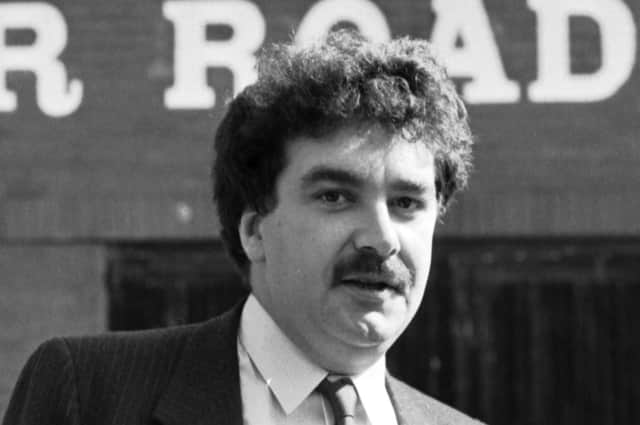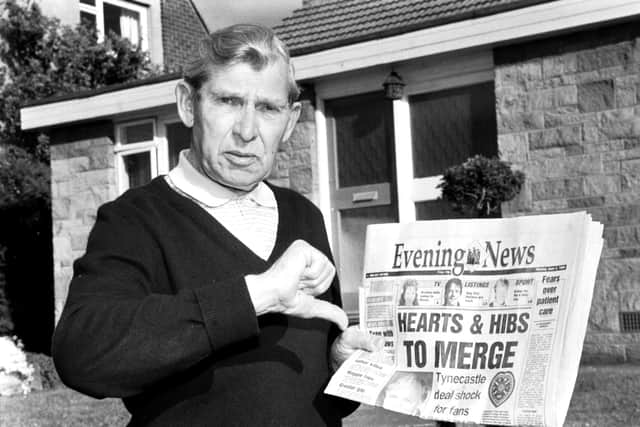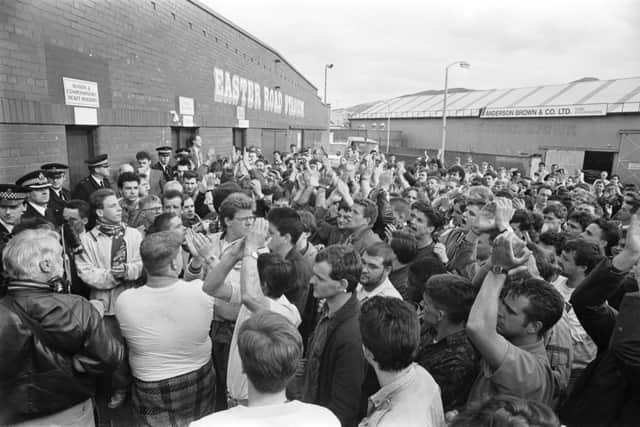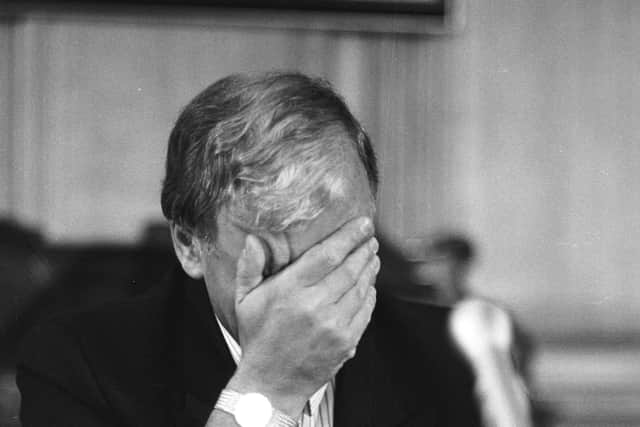Former Hibs chairman David Duff speaks for first time on then-Hearts owner Wallace Mercer's takeover bid - 'it wasn't a merger, it was a destruction'


When David Duff was made an offer for his shares from Hearts owner Wallace Mercer in June 1990, he could quite literally have taken the money and flown off into the sunset.
In his mid-30s at the time, the then Hibs chairman admits he was a product of the era, though there was a confusing twist. He was a Thatcherite, a yuppie and, he says now, a socialist. He was also a trained pilot.
Advertisement
Hide AdAdvertisement
Hide AdThis urge to learn to fly was not an exercise in corporate oneupmanship. He was simply desperate to overcome a fear of flying. This phobia threatened to hamper the activities of a young football executive with a taste for life in the fast lane. He obtained his pilot’s license after joining a flying club at Turnhouse airport and flew himself to games at Pittodrie and even the short hop to Dundee.


It might have been an extreme form of therapy, but it worked. David Rowland, Hibs’ major shareholder and whose funding helped Duff – than aged 33 - buy the Easter Road club in 1987, divided his time mostly between Monaco and London. Duff, based in Edinburgh after moving from Marlborough in Wiltshire, was regularly required to board a plane, often at short notice.
The most memorable of these occasions was when he was summoned to see Rowland for a meeting that took place thirty years ago today. The future of football in Edinburgh as we knew it then and still know it now hinged on it. The summit – held in a suite at the London Hilton on Park Lane - threatened Scottish football’s entire landscape. The ripples can still be felt to this day.
‘If I’d agreed – game, set and match’
It’s possible to form the impression that Duff is still trying to process how he felt when Rowland asked if he could introduce the prospective purchaser of Hibernian Football Club and Mercer walked into the room. “It was surreal,” says Duff, who has broken his long silence ahead of the 30th anniversary of the thwarted takeover. “I was looking at someone but my brain was thinking: ‘you don’t fit into this’.”


Advertisement
Hide AdAdvertisement
Hide AdIt was explained that Mercer was making a bid at 40p a share which valued Hibs at around £6m net after all debts. Duff stood to gain as much as £700,000. “If I had agreed to what was offered that night in London it would have been game, set and match - the matter settled before it was even announced,” he says.
Edinburgh United – but not really
Duff quickly established that this ‘Edinburgh United’ would look familiar. “They were going to play in maroon, play at Tynecastle and be called Hearts. This was not about Edinburgh United, it was not a vision. If it had been a vision, he would have talked to me three or four months before and it would have been something we discussed together. It was not a merger, it was a destruction of Hibs for nothing more than money.”
Just when Hibs thought they might be getting somewhere, the rug was being pulled from under their feet. They had recently returned to Europe after an absence of eleven years, overcoming Hungarian side Videoton before coming unstuck against RFC Liege. Now reconstituted as an amateur side after going bankrupt in the 1990s, the Belgian club are a stark reminder of what might have happened at Easter Road.


"Be sure, if I had agreed to that proposition Hibs would not exist today or at least not in the form and position they are now," says Duff. "At best they would be like Royal Liege, a ghost of a great past."
Advertisement
Hide AdAdvertisement
Hide AdRowland warned about the potential personal cost to Duff, which proved eerily prophetic.
"He told me that if I were to win nobody would recognise or remember what I did," Duff recalls. "My legacy would be that it was all my fault and I would be the villain of the piece. I would never be involved in football again and would be ruined."
The road to near destruction
Edinburgh-born Duff was once a member of the Carlton Hibs supporters’ club so the chance to become chairman at Easter Road, even though he had since moved south, was something he grabbed. According to The Scotsman, installing a fax machine at the club was "one of Duff's first moves" - as was appointing Jim Gray, his brother-in-law, as chief executive.
Dramatic change was planned but it did not involve being swallowed up by Hearts. Duff envisaged the club moving to an out-of-town stadium in a retail park at Straiton - Hearts were soon trying to do likewise on greenbelt land at Hermiston.
Advertisement
Hide AdAdvertisement
Hide AdIn 1988 Duff took the decision to list the club on the stock market, the first Scottish club to go down this route and the second in Britain after Tottenham Hotspur.
Financial pressure was being exerted on the club from the unlikely source of south west England, where Duff was persuaded by Rowland to invest in what turned out to be a chain of failing hotels, bars, clubs and restaurants. He describes himself as “naïve” in his dealings with Rowland, who was once described by the London Evening Standard as having the “emotions of an ashtray”.
Playing a man down thanks to Avon Inns
The name Avon Inns still sends shudders down the backs of Hibs fans of a certain age. For a football club It was a handicap akin to playing with ten men every week.
It was meant to be a money-making scheme. Instead it was a near-fatal drain on resources.
Advertisement
Hide AdAdvertisement
Hide AdBy the time he was ambushed by Mercer in London, Hibs were “already 3-0 down and yet to arrive at the ground” in terms of the plan to destroy them. Rowland had struck an irrevocable agreement with Mercer with the club’s institutional shareholders sure to follow. It meant the Hearts owner could already all but bank on 60 per cent of the shares.
The Bank of Scotland, Hibs' bankers as well and where future Dunfermline chairman Gavin Masterton was managing director, had agreed to finance the deal. Their terms required Mercer to have just over 75 per cent of the shares to trigger funds. Duff owned around 12 per cent himself. Supporters, meanwhile, held another, slightly smaller portion.
Key detail in the shares as Rowland planned exit
Duff suspected around two per cent, a small but potentially critical number, were ‘warehoused shares’ – owned by Rowland, but not in his name, and therefore not valid in a vote. Duff succeeded in having them disenfranchised. “I always thought Rowland had more shares than he was saying – and I was right,” says Duff, whose relationship with this financial big beast, a long time Conservative Party donor, had begun to fray.
Things were not helped by Duff giving manager Alex Miller the green light to spend £175,000 on Morton striker Mark McGraw, whose Easter Road career was hampered by injury, after being told in no uncertain terms by Rowland to stop spending money on players.
Advertisement
Hide AdAdvertisement
Hide AdRowland wanted out. Mercer offered a way, however divisive. Duff worried that the Bank of Scotland might be persuaded to alter the terms of the deal they had with Hearts. Fortunately, Duff found an ally on that front – Hands off Hibs, the hastily formed and admirably effective supporters’ pressure group led by Kenny McLean senior.
Knight in green-and-white armour
“From the beginning, what worried me is that the bank could have changed the rules and said: ‘look if you have 70 per cent, we will change our offer to say we have accepted it’,” says Duff. “That would put me out of control. The bank could always usurp anything I did.
“Kenny McLean snr, who I had a lot of time for, came to us and said: ‘we do not know what to do’. I said: ‘what I would like you to do – and I cannot say this, because stock exchange rules forbid it - is get all the Hibs supporters who have Bank of Scotland accounts to put their green and white scarves on and queue up and close them’.
“Kenny was an incredible organiser. Within three or four hours he had queues of people outside banks of Scotland closing their bank accounts.
Advertisement
Hide AdAdvertisement
Hide Ad“Masterton eventually called us and said: ‘what do I have to do to call them off?’ I told him he had to give a public promise to keep to the 75 per cent. He did that. I was then fairly confident we would win. It was the one variable I had no control over.”
Mercer’s intentions become public – and an unlikely ally emerges
News of Mercer’s intentions had broken following a press conference held at the Caledonian Hotel on June 4, the Hearts owner’s 44th birthday. Duff, who Rowland and Mercer were convinced would find the promise of a personal windfall too tempting, was meant to be there too, on stage with the Hearts owner holding up either end of an “Edinburgh United” scarf.
Instead, he was at Easter Road preparing a rearguard action. He received some perhaps unexpected support from Sheila Rowland, ex-wife of Rowland and mother of the tycoon’s two children. She had been placed on the board by Rowland, becoming Scottish football’s first female director in the process. Despite some instances where she was barred from all-male boardrooms at opposition grounds, Tynecastle being one of them, Duff says she “fell in love with Hibs”.
Advertisement
Hide AdAdvertisement
Hide AdDuff learned Mercer would likely return with a better offer – 45 pence a share this time, as opposed to 40p. He still resolved to hold firm despite being told by the club’s financial advisors to “think like a Stock Exchange chairman, not a football fan”. He had already handed the keys of Easter Road to stage a supporters’ rally.
“We were on the same side,” says Duff. “I was certainly not on Wallace Mercer’s side. In some respects, I felt sorry for Wallace – well, only a little bit. I think he was a pawn in a bigger game.”
Writing a book
The details of this bigger game, some of them genuinely gobsmacking, are set to see the light of day in a book Duff, now 66-years-old and based in the south of England, has written during lockdown. Provisionally titled Heroes and Villains, he hopes it will be published later this year. It’s clear he believes a reassessment of the period – and certain personalities involved - is long overdue. The facts are plain, he says, and should not be obscured by 30 years’ worth of others promoting their own agendas.
His gripe is that, had he taken the money and run, he would have been portrayed as the man who destroyed Hibs. He didn’t do that and yet there aren’t too many people hailing Duff as the man who saved Hibs these days, nor were there then, when emotions were still raw. Many took the view that an initially tempted Duff had taken fright at the sheer scale of the outrage.
Advertisement
Hide AdAdvertisement
Hide AdA planned second volume of memoirs will deal with another testing chapter in his life – a two-year prison sentence in 1993 following a fraud conviction, 12 months of which was served at Ford Open Prison in Sussex. “It’s why every other article refers to me as the “disgraced solicitor”,” he says. “I was not blameless. I made mistakes”.
While unrelated to Hibs, the episode cannot be entirely separated from this earlier spell in his life either. “I do believe, if I had sold my shares, none of this personal devastation would have happened,” he says. And yet, he stresses, it would still not persuade him to shake hands on a deal with Wallace Mercer.